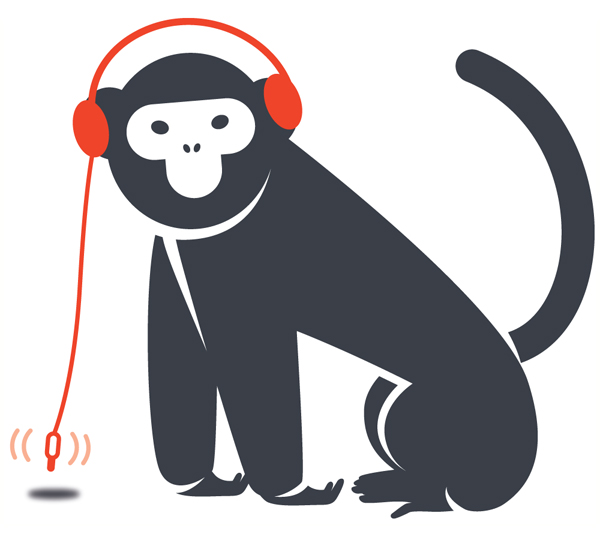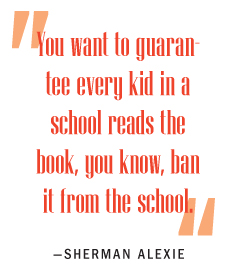Hear No Evil | Listen In
 “Did you read that with your eyeballs or your ears?” was a frequent question from our Arlington, VA, middle school readers’ group. They didn’t think listening was “cheating” (many of them were enthusiastic listeners), but they acknowledged the difference between literature experienced in print and through audio.
“Did you read that with your eyeballs or your ears?” was a frequent question from our Arlington, VA, middle school readers’ group. They didn’t think listening was “cheating” (many of them were enthusiastic listeners), but they acknowledged the difference between literature experienced in print and through audio.
So, too, does author John Green, a proponent of audiobooks and an avid listener who talks with teens about audio productions of his books, savoring their insights on narrators and voice. In a 2012 interview, Green acknowledged that reading with your ears is different from reading with your eyes, saying, “When you listen to an audiobook, you don’t have sovereignty over what you’re reading. You don’t choose how to scan the page. On the other hand, you don’t have the option to skip things. You can’t get a third of the way through a long paragraph and decide to go to the next indent.” He believes that difference helps teens more easily comprehend books they might otherwise find intimidating.
Green is familiar with having his books challenged. His debut novel, Looking for Alaska (Brilliance Audio, 2006), winner of the 2006 Michael L. Printz Award for literary excellence in young adult literature, has been on several of the ALA’s Top Ten lists of frequently challenged books of the 21st century. Set in Alabama, the novel tells the story of 16-year-old Miles Halter and his extraordinary friends at Culver Creek boarding school. But it is the sexy, free-spirited, self-destructive Alaska Young who is the focus of Miles’s attention. Introducing Green’s characteristic smart, snarky, devious, and delightful protagonists, the elegant repartee is beautifully interpreted by Jeff Woodman. His age-appropriate narration wrings all of the angst from this quintessential coming-of-age story without it ever going over the top in pacing or inflection. Precisely because listeners can’t fast-forward through the uncomfortable or mature parts, the audiobook heightens the tension and emotional impact of the story.
 Sherman Alexie’s fictional memoir for young adults, The Absolutely True Diary of a Part-Time Indian, (Recorded Books, 2008) is on five of ALA’s Top Ten lists for frequently challenged books. The recipient of the 2007 National Book Award for Young People, Alexie narrates the work, and his outstanding performance contributed to the work’s 2009 Odyssey Award for excellence in audiobook production. Challenged for its unflinching look at poverty, racism, violence, and sex, listeners feel Junior is relating his story just for them. In some ways, this makes the audio more difficult than the print. With print, readers can often gloss over parts they’re not emotionally ready for, but with audio that’s not possible.
Sherman Alexie’s fictional memoir for young adults, The Absolutely True Diary of a Part-Time Indian, (Recorded Books, 2008) is on five of ALA’s Top Ten lists for frequently challenged books. The recipient of the 2007 National Book Award for Young People, Alexie narrates the work, and his outstanding performance contributed to the work’s 2009 Odyssey Award for excellence in audiobook production. Challenged for its unflinching look at poverty, racism, violence, and sex, listeners feel Junior is relating his story just for them. In some ways, this makes the audio more difficult than the print. With print, readers can often gloss over parts they’re not emotionally ready for, but with audio that’s not possible.
Is this a reason to ban the audio? Of course not. As Alexie has said, “When they ban or challenge a book, it instantly makes it prime reading material for that community. You want to guarantee every kid in a school reads the book, you know, ban it from the school.”
It is important to note that many books are challenged because of LGBTQ content—even picture books about penguins. In honor of the 10th anniversary of And Tango Makes Three, by Justin Richardson and Peter Parnell, with illustrations by Henry Cole (S. & S. Audio, 2015), a book and CD set was released, the audio narrated by the incomparable Neil Patrick Harris. Based on the true story of two male chinstrap penguins that incubated, hatched, and raised a little penguin from a “donated” egg at New York City’s Central Park Zoo, And Tango Makes Three has been on the Banned Books list seven times since its publication in 2005, including four times at number one. Harris’s pacing keeps the text moving while allowing listeners following along with the print book to absorb Cole’s luminous, realistic illustrations, providing a glorious way for pre-readers to enjoy this story.
Top Ten Most Challenged Books of 2015
Looking for Alaska, by John Green (Brilliance, ISBN 9781455870042)
Fifty Shades of Grey, by E.L. James (Books on Tape, ISBN 9780385360074)
I Am Jazz, by Jessica Herthel and Jazz Jennings (audio edition unavail.)
Beyond Magenta: Transgender Teens Speak Out, by Susan Kuklin (Brilliance, ISBN 9781480583634)
The Curious Incident of the Dog in the Night-Time, by Mark Haddon (Recorded Books, ISBN 978-1419317262)
The Holy Bible (multiple audio editions available)
Fun Home, by Alison Bechdel (audio edition unavail.)
Habibi, by Craig Thompson (audio edition unavail.)
Nasreen’s Secret School: A True Story from Afghanistan, by Jeanette Winter (audio edition unavail.)
Two Boys Kissing, by David Levithan (Listening Library, ISBN 9780804123716)
This list was compiled by the American Library Association’s Office of Intellectual Freedom.
With transgender issues so often in the news lately, the following titles focus on the lives of transgender teens speaking out. Books that focus on transgender topics are frequently prime material for censorship. Listening to these stories enhances an understanding of the difficulties facing these teens.
Released in June 2016, Jazz Jennings’s Being Jazz (Listening Library) hasn’t appeared on a challenged list yet. However, Jennings’s picture book, coauthored with Jessica Herthel, of her early life, I Am Jazz (Dial, 2014), was number three on 2015’s list of most challenged books. Jennings, a transgender teen with a supportive family, narrates her own story with abundant enthusiasm and confidence. She’s appeared on TV with Barbara Walters and Oprah Winfrey, and even has her own show on the TLC network. The author reads with typical teen energy, making her story compellingly real. It will be interesting to see if Jennings’s latest book receives any negative attention.
In February 2014, Susan Kuklin spoke with SLJ’s Luann Toth about her book Beyond Magenta: Transgender Teens Speak Out, number four on the 2015 Most Frequently Challenged Books list. This series of interviews conducted with transgender teens and young adults by Kuklin (Brilliance Audio, 2015) is read by multiple narrators, including Janina Edwards, Marisol Ramirez, Nancy Wu, Nick Podehl, Roxanne Hernandez, Tanya Eby, and Todd Haberkorn. Unlike Jennings, many of these teens struggled with their gender identity and were ostracized by family, school administrators, teachers, and peers. Hearing their heartbreaking stories aloud takes the material to a higher emotional level.
This year, celebrate Banned Books Week (September 25–October 1) by discovering a new way of interacting with literature—join your students in reading, listening to, and discussing a challenged book.
RELATED
The job outlook in 2030: Librarians will be in demand
The job outlook in 2030: Librarians will be in demand
ALREADY A SUBSCRIBER? LOG IN
We are currently offering this content for free. Sign up now to activate your personal profile, where you can save articles for future viewing






Add Comment :-
Be the first reader to comment.
Comment Policy:
Comment should not be empty !!!